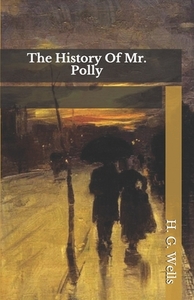Take a photo of a barcode or cover
I read this not long after reading Orwell's Coming Up For Air. This one is a much better novel, but they're interesting as two books about very similar characters in very similar circumstances; in the wrong class in Britain at the wrong time, badly educated, badly married, dreams lost, no real prospects or hopes or pleasure left in life when the books begin. Wells is much more subtle about the blind ignorant ways in which people can make themselves miserable in life, and get what they put out.
Also, in this one, the author has sympathy for his protagonist, warts and all, and he shows the internal forces shaping his life just as strongly as the external. Nobody in it is a simple caricature. And it is funny. I don't think I ever laughed out loud, but I was smiling a lot, and wincing too. The story is slower at first, and then starts leaping along in all kinds of startling and funny ways. The fire chapter is well worth the price of admission all by itself.
Also, in this one, the author has sympathy for his protagonist, warts and all, and he shows the internal forces shaping his life just as strongly as the external. Nobody in it is a simple caricature. And it is funny. I don't think I ever laughed out loud, but I was smiling a lot, and wincing too. The story is slower at first, and then starts leaping along in all kinds of startling and funny ways. The fire chapter is well worth the price of admission all by itself.
From TIA:
Three part dramatisation of H G Wells' 1910 "comedy" novel.
https://archive.org/details/HistoryOfMrPolly_201708
Three part dramatisation of H G Wells' 1910 "comedy" novel.
https://archive.org/details/HistoryOfMrPolly_201708
I found too much of this too dull to give it 4 stars but there were excellent parts (the wedding, the fire, the tramp wandering and the fights with Uncle) so I'm torn.
From Robert McCrumb:
"... there are three elements to The History of Mr Polly that unite to give the book an enduring appeal, and to place it at the top of Wells's extraordinary output. First, Wells's picture of Mr Polly – an ironic self-portrait – is deliciously appealing. In the literary tradition of Mrs Malaprop, and many minor Dickens characters, Mr Polly has an "innate sense of epithet" that inspires a teeming vocabulary: "intrudacious", "jawbacious" and "retrospectatiousness".
Second, Mr Polly (who could have stepped from the pages of Dickens) is a "little man" of a kind typical of late Victorian and Edwardian England, a man painfully, even doggedly, liberating himself from an oppressive class-ridden society. The debt to Dickens is unequivocal. Alfred Polly is descended from Joe Gargery, Bob Cratchit and Mr Wemmick. He's also related, as it were, to Mr Pooter, is contemporary with EM Forster's Leonard Bast, and will subsequently inspire many Kingsley Amis protagonists, as well as Billy Liar.
Finally, The History of Mr Polly is a comedy of ordinary, provincial life, rooted in the everyday, with countless brilliantly observed details. In part of the long flashback that composes the middle part of Mr Polly's "history", there's a hilarious wedding which commits him to Miriam, an event that inspires one of Wells's best lines: "He had a curious feeling that it would be very satisfying to marry and have a wife – only somehow he wished it wasn't Miriam."
From Robert McCrumb:
"... there are three elements to The History of Mr Polly that unite to give the book an enduring appeal, and to place it at the top of Wells's extraordinary output. First, Wells's picture of Mr Polly – an ironic self-portrait – is deliciously appealing. In the literary tradition of Mrs Malaprop, and many minor Dickens characters, Mr Polly has an "innate sense of epithet" that inspires a teeming vocabulary: "intrudacious", "jawbacious" and "retrospectatiousness".
Second, Mr Polly (who could have stepped from the pages of Dickens) is a "little man" of a kind typical of late Victorian and Edwardian England, a man painfully, even doggedly, liberating himself from an oppressive class-ridden society. The debt to Dickens is unequivocal. Alfred Polly is descended from Joe Gargery, Bob Cratchit and Mr Wemmick. He's also related, as it were, to Mr Pooter, is contemporary with EM Forster's Leonard Bast, and will subsequently inspire many Kingsley Amis protagonists, as well as Billy Liar.
Finally, The History of Mr Polly is a comedy of ordinary, provincial life, rooted in the everyday, with countless brilliantly observed details. In part of the long flashback that composes the middle part of Mr Polly's "history", there's a hilarious wedding which commits him to Miriam, an event that inspires one of Wells's best lines: "He had a curious feeling that it would be very satisfying to marry and have a wife – only somehow he wished it wasn't Miriam."
